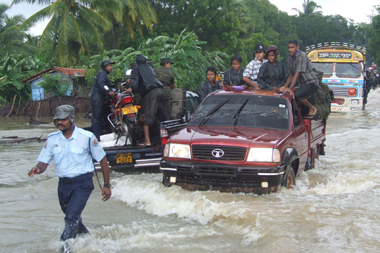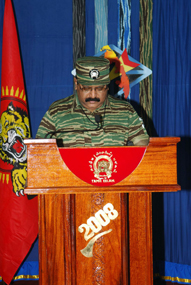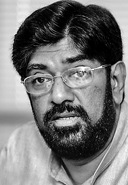Hours ahead of Tiger guerrilla leader Velupillai Prabhakaran's "Maveerar" ("Great Heroes") Day speech on Thursday, Chief of Defence Staff (CDS), Air Chief Marshal Donald Perera sent out an urgent message to Commanders of the Army, Navy, the Police Chief and the Director General of the Civil Security Division (CSD).
He directed that troops, police and CSD personnel remain under "highest security alert" immediately. In particular, he told them to enhance security in the Colombo area and the southern coast. The reason - the Liberation Tigers of Tamil Eelam (LTTE) "in desperation could carry out co-ordinated ground, air and sea attacks on important locations inland/coastal."
The warning seemed a precautionary move. Neither in the Colombo area nor in the south have the guerrillas carried out such a co-ordinated ground, air and sea attacks in the past. Yet, Air Chief Marshal Perera's warning underscored such a possibility. This is despite the LTTE losing large extents of land it dominated in the Wanni and is now fighting to defend Kilinochchi and Mullaitivu areas. The Army has placed a siege on the shrinking terrain they dominate.
 |
| An LTTE “policeman” leads a brand new Tata single cab truck loaded with guerrilla cadres through flood waters near Kilinochchi this week. Another truck carries a motor cycle unable to take to the road due to heavy flooding. |
Those closely following successive "Maveerar" speeches observed a difference last Thursday. It is a known fact that the LTTE leader does not deliver his speech to an audience made up of civilian supporters. Yet, his "military commanders," unlike during previous years, were not by his side. Hand out photographs those years showed them with their leader. This time, however, they were busy in the battlefront. If some were present, they avoided photo opportunities. Photographs posted this week on pro-LTTE Tamil web sites showed only Pon Thiyakam, head of LTTE's "Maveerar" office.
Mr. Prabhakaran's speech last Thursday focused more on security-related issues and matters arising from them. Though rhetoric or otherwise, the tone was strongly defiant when it came to his response to the ongoing military offensives. Compared to happenings of the past, he said, "today's challenges are neither novel nor huge." He declared, "we will face the challenges with the united strength of our people." He charged that the government "is living in a dreamland of military victory. It is a dream from which it will awake. That is certain." Only weeks earlier, he had told a Tamil Nadu newspaper during an e-mail interview that seizing Kilinochchi
was a "day dream" of President Rajapaksa.
The Government's response to the LTTE leader's speech came from Minister and Defence Spokesman Keheliya Rambukwella. See box story on this page for his comments.
Are Mr. Prabhakaran's remarks a pointer that the guerrillas may switch roles from a largely defensive posture protecting shrinking terrain to an offensive one? That is particularly in areas outside the battle zones. Air Chief Marshal Perera also admits to the possibility when he says that "in desperation they could carry out co-ordinated ground, air and sea attacks."Mr. Rambukwella told The Sunday Times “We know and we expect it. We are taking all the preparations to face any threat.”
Though Mr. Prabhakaran declared that he wished to stop the war and seek "a political resolution to the national question," he waited that hoping political transformation will happen in the future is futile."He said
“ therefore our people are not ready to trust the Sinhala nation again and get cheated." At least hypothetically, that appeared to shut the door on any future peace talks. The only possibility is if the guerrillas relent.
If the remarks further underscored threats to respond militarily, it also raised another question. Is the LTTE leader trying to seek justification in advance for such possible action? That is by placing the blame on the government on a number of issues and playing the role of the under dog. One such instance is the rejection of LTTE offers for a ceasefire. The LTTE leader pointed out that ahead of the SAARC (South Asian Association for Regional Co-operation) summit in Colombo in July, this year; the LTTE had offered to suspend hostilities.
 |
| The LTTE leader delivering his speech
– LTTE photo |
Accusing the government of rejecting their overture and ridiculing them, Mr. Prabhakaran added it (the government) had "laid down unacceptable and insulting conditions." This was a reference to government's call to lay down arms. The catalogue of woes gains significance since the thrust of Thursday's speech is directed both at the international community and India. Here are some relevant extracts:
"…….Besides, our struggle does not contravene the national interest, geo-political interest or economic interest of any outside country. The inherent aspirations of our people do not in any way hamper the national interests of any country or people. At the same time, it may be noted that during the long history of our struggle, we have not conducted any act of aggression against any member state of the international community.
"Our freedom movement, as well as our people, have always wished to maintain cordiality with the international community as well as neighbouring India. With this in view, we wish to create a viable environment and enhance friendship. We wish to express our goodwill and are looking forward to the opportunity to build a constructive relationship.…
"Today, there are great changes taking place in India. The dominant voices in support of our struggle are re-emerging aloud again. There are also indications of our struggle becoming accepted there. The positive change in environment gives us courage to seek renewal of our relationship with the Indian super power…."
Even before the LTTE leader could utter those words about "indications of our struggle becoming accepted" in India, there was bad news for him. A string of terror attacks in Mumbai, India's commercial capital on Wednesday night outraged the international community. Several world leaders condemned the attacks, described by The New York Times as the worst since 9-11, the attack on the World Trade Centre. More than 200 killed during 64 hours of mayhem were civilians.
There was now a new message for the LTTE that was wooing both the international community and India. Any terror attacks on civilians or disrupting the life of the community in Sri Lanka will not only bring them isolation but also other forms of punitive action. Equally important, the LTTE's expectation "to build a constructive relationship" with India would also become difficult under the circumstances. This is despite behind-the-scene efforts by influential groups in both India and Sri Lanka.
However, the LTTE's move to reach out to India has appeased sections of the Tamil community, including the Tamil National Alliance. They were earlier disappointed by the turn of events following the visit to New Delhi by Basil Rajapaksa MP, the President's special envoy.
Whilst strongly condemning the heinous acts in Mumbai and vowing strong punitive action, New Delhi would find it hard put to thaw its relations with the LTTE to any level. They have just renewed the ban on them. This is also notwithstanding the pressure Tamil Nadu political leaders want to exert for an immediate ceasefire in Sri Lanka and the resumption of peace talks. New Delhi will find it even more difficult to tell the Colombo government to stop its "war on terror." This is at a time when the task of intensifying India's own "war on terror" has fallen on the Congress Government.
Mr. Prabhakaran also took a swipe at the Donor Co-chairs of the peace process. Though not making a direct reference, he said, "some countries which identified themselves as so-called peace sponsors, rushed into activities which impaired negotiations." The Co-chairs are made up of the United States, Japan, the European Union and Norway. In an obvious reference to the European Union, he said "they denigrated our freedom movement as a terrorist organisation. They put us on their black list and ostracised us as unwanted and untouchables."
This week, heavy rains, followed by Cyclone Nisha, played havoc in the Jaffna peninsula and the Wanni. In the peninsula, it caused the worst floods in three decades affecting 73,000 families. Accommodated in 261 camps (schools, community centres and government buildings) are 17,000 families.
The Northern Area Naval Headquarters in Kankesanthurai was hit by strong cyclonic winds. Two cargo vessels, one unloading cargo and the other awaiting to unload, both inside the harbour ran aground. So did five Dvora fast attack craft (FACs). The cargo vessel MV Nimalawa, badly damaged by the Sea Tiger attack on October 22 had been towed to the seas off Myliddy. It was to be towed to Colombo but procedural delays had halted it. The vessel also ran aground in Myliddy sustaining more damage.
In the Wanni, the flooding due to torrential rains worsened after Cyclone Nisha. This caused considerable difficulties for the troops, both in the movement of supplies to the frontlines as well as the evacuation of casualties. Compounding the situation further was the bad weather preventing air movements.
As reported last week, troops have placed siege on Kilinochchi and Mullaitivu areas. They are moving in six different flanks to regain control of more areas dominated by the guerrillas.
Troops of Task Force 1 and the Army's 57 Division that advanced along the Pooneryn-Kilinochchi Road (towards Kilinochchi) have met with stiff rebel resistance.
This is from an area where a bund cum ditch is located. In the heavy fighting, both sides have suffered casualties.Some troops were also missing in action. Heavy flooding in this sector had forced guerrillas to shift positions to the rear. This fuelled reports in some government quarters that the guerrillas were withdrawing from Kilinochchi. However, troops found they have taken up positions and were directing fire.
The Army's 57 Division, moving in a northerly direction from Akkarayan, is four kilometres away from the Kilinochchi town, just a little distance from the boundary of the town areas. Task Force 1 moving (along Pooneryn-Kilinochchi) road with elements of the 57 Division is eight kilometres away from the town area. Troops of Task Force 3 who are advancing eastwards from Mankulam this week re-captured Olumadu. However, significant territorial gains were made by the 59 Division, which is advancing north of the Weli Oya sector. Military Intelligence sources said that in a bid to fortify their defences further, the guerrillas were withdrawing their cadres from areas far south of Mullaitivu.
Mr.Prabhakaran said on Friday that his fighters were offering "unbending" resistance over what he describes as "the war of aggression." Despite the heavy rains, troops are forging ahead. Their priority remains the two LTTE strongholds, Kilinochchi and Mullaitivu.
Prabha pleading on his knees: Keheliya
The Government's response to LTTE leader, Velupillai
Prabhakaran's "Maveerar" ("great heroes") day speech came from
Minister and Defence Spokesman Keheliya Rambukwella. He said: "There are two salient points in Prabhakaran's speech. The important one is calling for countries to lift the ban on their organisation. If you read between the lines he is pleading to release the criminals held in the countries where they (the LTTE) are banned, enabling them to carry on their criminal activities.
"So basically, Prabhakaran has accepted the fact that he is an 'A' grade criminal. His criminal activities were tolerated all this while. Now right across the world he is being checked and he is being barred from getting into these villainies and criminal activities.
"He is pleading with them, 'please allow me to do that again.' He is saying 'I am a criminal and my colleagues right across the world are unable to gather momentum for my terrorist organisation. So please let them be free and let them get on with their criminal activities.
"Prabhakaran says lift the ban. Let his activists carry out their activities. Lifting the ban results in freeing all the people who have been jailed.
"The other point he is making is that he has accepted that the Sri Lankan forces have completely overrun their (the LTTE's) ability and their military power. On the other hand he says that they have been friendly with India, there was some misunderstanding and they must now rebuild the relationship and all that.
"He also says when India was with them, or rather when India had this relationship, they were able to meet any superpower. Whom did they meet? The only superpower they met was India".
"During the time there was soft corner by India they were trying to fight the Indian Peace Keeping Force (IPKF). They did not stop at that. They went on to kill Prime Minister Rajiv Gandhi".
"He is saying India to support them. He is saying right now we are being throttled down. As a result, we are helpless. Therefore, give us some kind of assistance. The difference between last time, all other speeches and this, is that he is saying that these people are his people. I mean earlier what he said, by the fact that they are Tamil, they have to be his people. Now he is saying "they are my people. He is trying to get to a point that they are 'my people' just because he is a Tamil.
"In other words, if you argue it, obviously he is feeling that the Tamils are divorcing from him, distancing from him, and they're looking at a different scenario altogether. They are looking at democracy. They are looking at development. They are looking at devolution at some level or the other. Therefore, he is feeling the heat.
"So if you look at the entire speech, they are trying to tie up the innocent Tamil civilians, the Tamil community which is not with them obviously. That's why they are pleading."
“All this time Prabhakaran thought he cannot be defeted. But now he has been confined to a small area. So when you see the media analysis and compare his speeches for ten years, you can get a better picture. He is in his last stages.
“He is talking from his death bed. That is the reason why he is appealing to the international community to lift the ban on LTTE.” |



